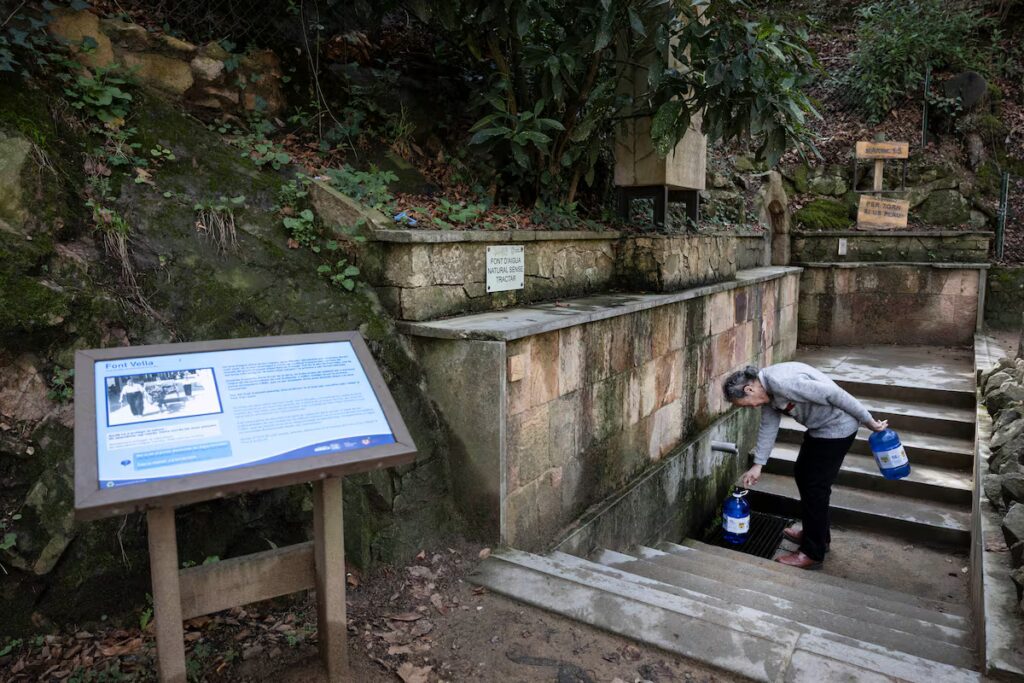
The quarterly receipt of water that arrived in October has put some residents and traders of Sant Hilari Sacalm on the warpath, a town of around 6,000 inhabitants between the Montseny massif and the Guilleries Natural Area, one of the territories richest in springs in all of Spain and which has water as its main economic driver. With the municipalisation of the service and the creation of Aigües de Sacalm (a company with municipal capital and Agbar), a tariff that had been frozen for 12 years was updated and in some cases the quarterly bills went from 200 to 680 euros, or from 35 to 189 euros. Neighbors have already demonstrated twice to protest and demand the mayor’s resignation. The City Council admitted from the beginning the errors resulting from the municipalization and promised to review the tariffs and grant bonuses to those affected. The neighbors, many of whom have returned the receipts, “wait” with little “trust”.
Sant Hilari Sacalm is a water territory. He inventoried 136 sources, although not all flow. Furthermore, it is the home of the natural mineral water Font Vella, it is also the birthplace of the Font d’Or water, although it is bottled in the nearby town of Arbúcies, and of Font Subirà, which is located between the municipalities of Sant Hilari and Osor.
However, they have a problem with the water network, which has been going on for some time. In 2009 Agbar purchased the water service from a private individual and the city council assigned it the role of sole provider of the service. CiU reported the fact to the courts which in 2015 canceled the concession and forced the City Council to resolve the situation. To this end, Agbar was forced to provide the service until the concession was terminated and the expropriation of the network began. Between 2015 and 2024 there were disputes without progress and the Municipality blocked the tariffs so that the supplier would not increase them. The company, seeing that it could not raise prices and risk losing the concession, made minimal investments in network maintenance. This, increasingly aged and damaged, was aggravated by the drought. «We have no problem with the water resource, but it has become urgent to resolve the network situation and we have seen the solution of creating a joint company for the integral water cycle, 51% owned by the Municipality and 49% by Agbar», explains mayor Jordi Rotllan of the Partit Independent de les Guilleries (PIG).
On July 1, Aigües de Sacalm, the new company, came into operation, and in October the proceeds arrived which sparked outrage. Prices, which have been stable for 12 years, have increased. According to the mayor, “60% of the population spends around 20 cubic meters of water per quarter, around 20 euros, the problem is the people who consume a lot, due to the pricing system based on the volume of consumption, or the businesses”, he specifies. Furthermore, he explains that “the problem is not so much in the price of water, but in the service fee, which in some cases has skyrocketed up to 300%, the fixed part of the bill, not the consumption or the tariff”.
The water bill between July and September lit the fuse. In a city bar run by some Chinese citizens they express their discomfort. They are “angry”, they know that the city council has issued a statement explaining that some errors would be resolved, but “they don’t trust”. One of her clients, Sofia, lives alone and says: “In my case the increase was significant, 15 euros, but people returned the receipts to me because there were exorbitant increases and they are waiting.” In another restaurant in the area the bill was doubled and they too do not hide their anger. They too, like Claudia, at home are dissatisfied with the new tariffs, “they are waiting to see what will happen in the next bill”. Another case is that of a pensioner who spends about two hours a day sorting out the rubbish he has in a garage with a bathroom far from his home. He went from paying the minimum, around 35 euros, to 189. He’s also waiting for the next receipt.
After the first demonstration and noting the anger of the neighbors, the City Council released a statement in which it describes the municipalization of water as a “courageous and correct decision” to guarantee the future of the service to the city. He also acknowledged that “the increases reported in the first bills are higher than those projected in the initial study and we understand the concern they have raised.” For this reason he informed the company “of the decision to implement a new rate that allows the increases to be applied in a more progressive manner”. This will involve “reviewing the planning of some planned investments to find the balance between the sustainability of the service and the ability of families to meet the expense”.
The Municipality commissioned an external engineer to define the new tariff. Initially, with Agbar, an investment of 5 million euros over 30 years was calculated between the improvement of the water and sewerage networks and with the expectation of paying for it with water tariffs. As well as correcting errors – that construction companies and provisional accountants were counted as industrial – and subsidizing subsequent revenue, Rotllan also indicated that the new tariff will be calculated based on the costs of running the service overall and investment for 2026 only.
On the 18th, under the motto “Water submerges us”, 400 residents took to the streets again, already forming the Platform in Defense of Water, asking that until there is a fair and balanced regulation of tariffs, the frozen tariffs will apply.





